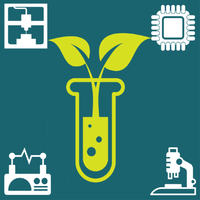Biomaker Challenge is a four-month programme challenging interdisciplinary teams to build low-cost sensors and instruments for biology. The programme aims to facilitate exchange between the biological and physical sciences, engineering, and humanities for the development of open source biological instrumentation using commodity electronics and DIY approaches.
The inaugural 2017 cohort comprises 130 participants working in 41 teams on biological and biomedical devices, instruments, and sensors. Participating teams received a Biomaker Toolkit and a discretionary budget for additional sensors, components, consumables, and mechanical fabrication worth up to £1000.
Teams of all sizes were considered for the grant and range from an individual to twelve people. Interdisciplinarity within participating teams is prioritised and although most participants are students or staff at the University of Cambridge, John Innes Centre or the Earlham Institute, external team members are welcome and included designers from the Royal College of Art, computer scientists from ARM, local artists, makers, and entrepreneurs.
During the challenge, we offer assistance and support providing components and access to prototyping facilities in Cambridge such as Cambridge Makespace and the Media Studio on the Cambridge Biomedical Campus. We also run periodic technical workshops and meetups to encourage teams to interact and help share skills and ideas. Participating teams will document a full set of assembly/fabrication instructions, images, and a list of components used, which are made publicly accessible via GitHub. This will enable others to replicate and build on their work for their own research questions. The challenge culminates on 21 October 2017 in a public exhibit, the Biomaker Fayre, where participants will demonstrate their creations and prizes will be awarded for especially creative and enabling projects.
The Challenge will repeat in 2018 and we look forward to seeing the projects develop with a new cohort of participants to further increase access to low-cost, open access biological tools and technologies.
Example Projects
Real-Time monitoring of cell proliferation
An absorbance sensor that can be used inside a cell culture incubator for real-time monitoring of culture medium pH and cell density. The system is able to automatically transmit this data to an email server for remote monitoring of cultured cells.
Microfluidic Turntable for molecular diagnostic testing
An Arduino controlled turntable with a stroboscope for disk visualisation on screen and optical detection for absorbance and fluorescence measurements. The disc, fabricated using a laser cutter and paper plotter, is rotated by an Arduino controlled motor. Fluid actuation is also controlled by Arduino, changing the rotation direction and revolutions per second to achieve pumping, mixing and separation.
A programmable staging mount, and an imaging platform for a microfluidics based conditioned learning hub for motile bacterial cells.
By developing a maze traversal challenge, different scenarios for chemotactic bacterial colonies to employ their decision-making machinery and navigate through the maze will be assessed. This may lead to an understanding of cognition, memory and learning in bacterial colonies.





